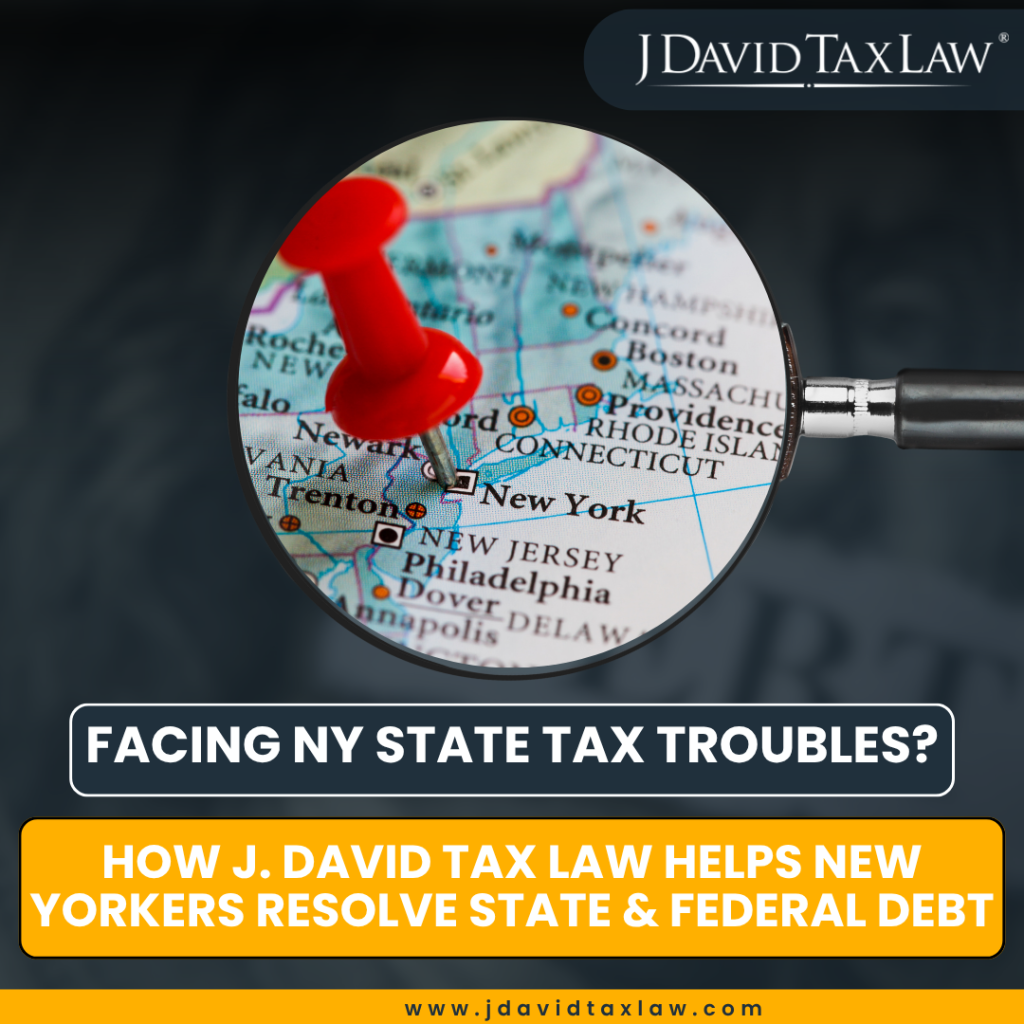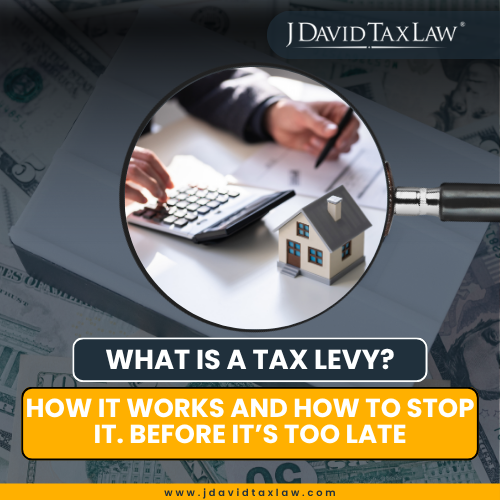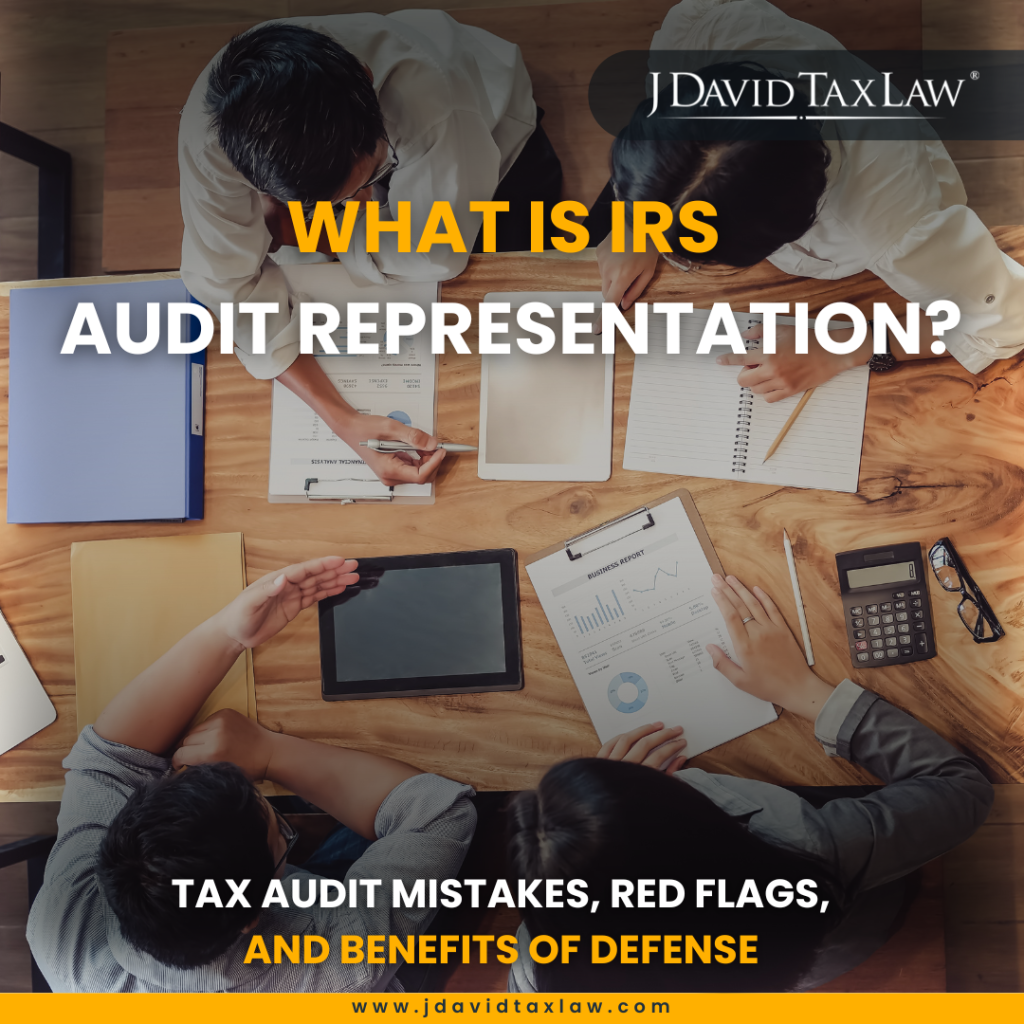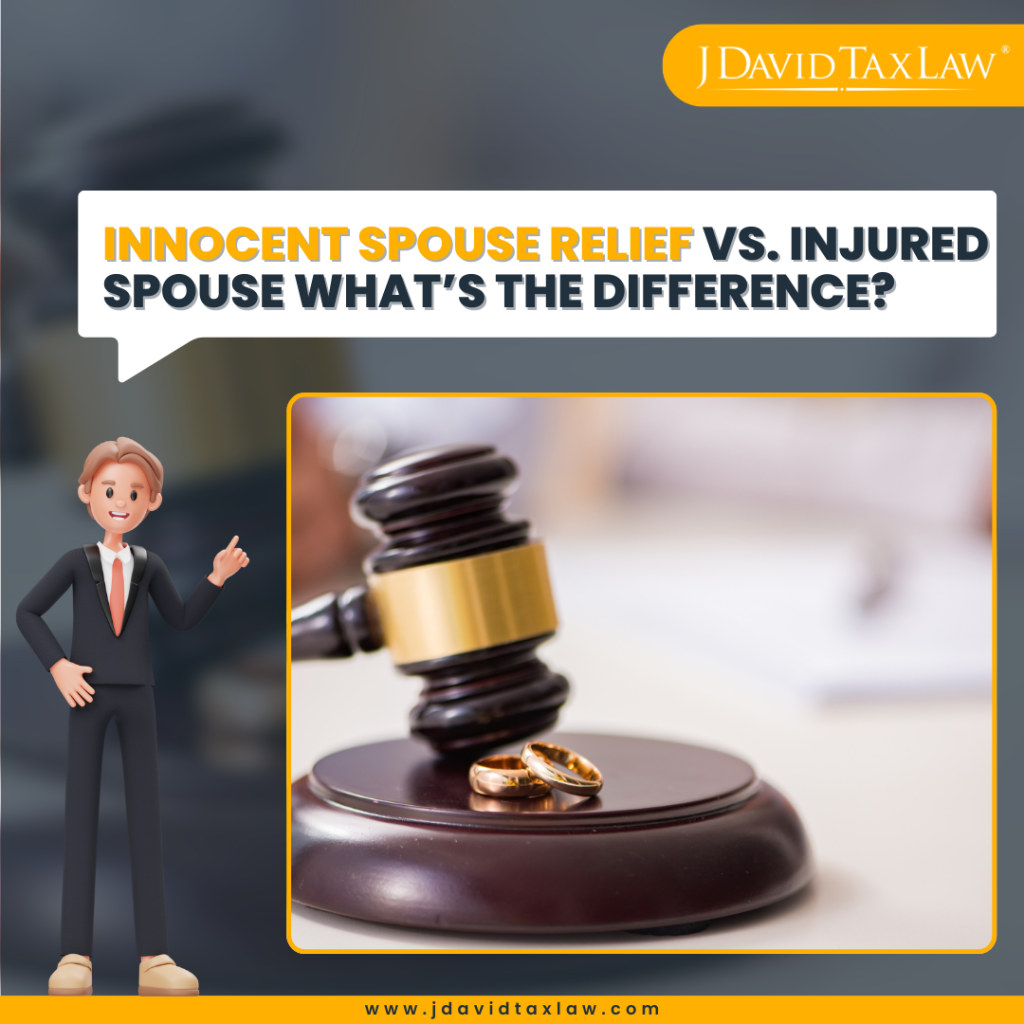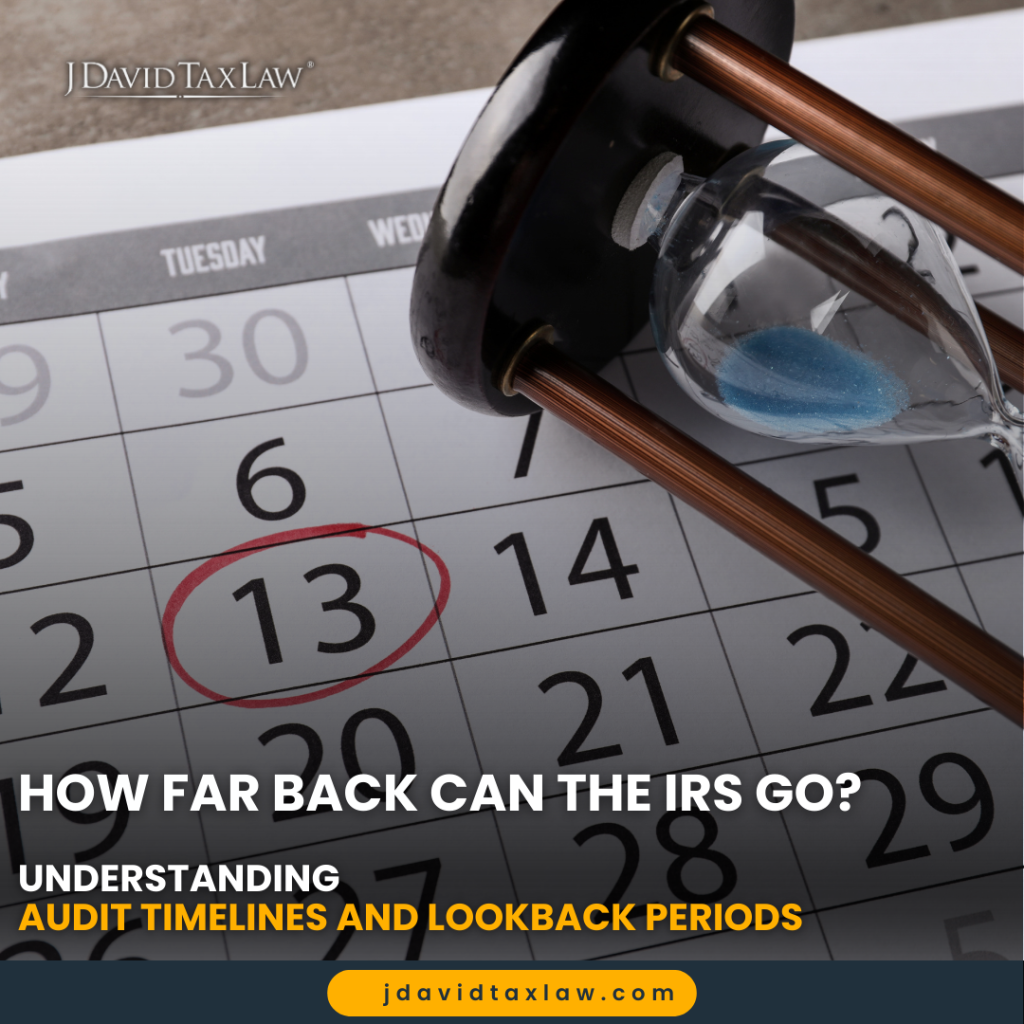The New York State Department of Taxation and Finance has strong collection powers and often acts faster than the IRS. Many New Yorkers face both state and federal tax debt concurrently, which can quickly lead to wage garnishments, bank levies, tax warrants, or license suspensions.
Resolving state tax debt is not the same as resolving IRS debt. Each agency follows its own process and enforcement timeline. Coordinating both takes careful legal strategy.
Fortunately, J. David Tax Law has a team of expert New York tax attorneys with decades of experience navigating state tax collections while managing IRS obligations. This article explains how we assist clients facing New York State tax troubles and why legal representation matters.
How NY State Collects Unpaid Taxes
The New York State Department of Taxation and Finance (DTF) uses several legal methods to collect unpaid taxes. Once you miss payments or fail to respond to notices, DTF can take the following enforcement actions:
Tax Warrants
A tax warrant is a legal judgment filed by the New York State Department of Taxation and Finance (DTF) when you fail to pay a tax debt. Once filed, it becomes a public record and functions similarly to a lien.
A tax warrant gives the state broad authority to collect your debt by seizing property or applying the warrant against personal or real assets. It can also appear on your credit report through third-party reporting, which can make it difficult to obtain credit or loans.
Tax warrants are one of New York’s primary collection tools and often signal the start of more aggressive enforcement if the debt remains unpaid. A tax law firm can help you go through the lien withdrawal process before it escalates.
Wage Garnishment
If you do not pay your tax debt or respond to notices, the New York State Department of Taxation and Finance (DTF) can issue an income execution, commonly known as a wage garnishment.
An income execution allows the state to require your employer to withhold a portion of your wages and send it directly to DTF. In New York, this can result in a significant reduction of your take-home pay, often creating financial strain for individuals and families.
Once a wage garnishment begins, it typically continues until the full debt, including penalties and interest, is paid. However, wage garnishment is not automatic or irreversible.
Bank Levies
The New York State Department of Taxation and Finance (DTF) can also enforce collection by issuing a bank levy. This allows the state to freeze and seize funds from your bank account to pay your tax debt.
When a bank levy is issued, your bank is legally required to freeze available funds in your account and remit them to DTF. You may receive little or no advance notice before this occurs. A bank levy can cause immediate financial disruption, preventing you from accessing your own money for essential expenses.
License Suspension
For certain unpaid personal income tax debts, New York can suspend your driver’s license. If your outstanding balance exceeds $10,000 and unpaid after notice, the Department of Motor Vehicles may be directed to suspend your license until the debt is resolved.
License suspension can create immediate hardship, especially for those who rely on driving for work or family responsibilities.
Refund Offset
If you are owed a tax refund from New York State, the IRS, or another state, DTF can apply that refund to your unpaid state tax debt. This process is known as a refund offset.
Many taxpayers discover this only after expecting a refund that never arrives. Refund offsets are an automatic process once your tax debt is certified as collectible.
Private Collection Agencies
In some cases, New York State may refer unpaid tax debts to private collection agencies. These agencies are authorized to contact taxpayers and attempt to collect the debt on behalf of the state.
Once a debt is referred, you may begin receiving calls or letters from the private agency in addition to notices from the state. While the agency must follow certain legal guidelines, many taxpayers find the experience stressful or confusing.
Seizure of Assets
New York State may pursue asset seizure for more severe or prolonged tax debts. This can include personal property, business assets, or even real estate, depending on the size of the debt and the state’s enforcement priorities.
Asset seizure is less common than wage garnishments or bank levies, but it remains a legal option when taxpayers fail to respond or resolve outstanding balances. Once assets are seized, recovering them or reversing the process becomes more difficult.
Careful legal representation is critical when a case reaches this stage. Timely negotiation, proper filing of legal defenses, or establishing payment arrangements early in the process can often prevent or recover from escalation to asset seizure.
The Overlap Between State and IRS Tax Debt
Many New Yorkers who owe back taxes do not face just one problem. It is common to owe both New York State and IRS tax debt simultaneously. The challenge is that each agency operates independently, with separate rules, timelines, and collection actions.
Paying one debt does not automatically resolve the other. In fact, if you are not careful, it is possible to end up in conflicting payment arrangements or face enforcement from both agencies at once.
For example, the IRS and the state can both issue wage garnishments or bank levies simultaneously, placing even greater strain on your finances. Each agency also has different procedures for penalty relief, offers in compromise, and payment plan approvals.
Coordinating a proper strategy is essential. Knowing which debt to prioritize, how to protect income and assets, and how to manage communication with both agencies is a critical part of resolving tax problems effectively.
This is where experienced legal guidance can make a significant difference. Understanding the full scope of your state and federal tax obligations and how they interact is key to achieving a lasting resolution.
Common NY State Tax Issues
Many New Yorkers seek legal help not just because the state is trying to collect, but because they face complex tax debt situations where legal guidance is critical. These are some of the most common issues we help resolve:
Large or Long-Standing Tax Debts
Significant personal or business tax debt that has accrued penalties and interest over several years often requires professional negotiation to achieve manageable terms. In one state case, a client with over $300,000 in tax debt and penalties worked with our firm to achieve full penalty and interest abatement after multiple failed attempts to resolve the debt alone.
Business Tax Liability (Sales and Payroll Taxes)
Business owners frequently face aggressive enforcement for sales tax or payroll tax debts. These cases often involve personal liability risks and require detailed legal handling. We represented a business owner audited by the IRS for more than $1.6 million in disallowed expenses and payroll-related tax issues. The client lacked access to key records, and payroll documentation was incomplete. Through strategic negotiation, we helped reduce the debt by over $550,000, protecting both the client’s business and personal finances.
Multi-Year Nonfiling
Taxpayers who have failed to file for multiple years risk compounding debt and enforcement. Re-establishing compliance and negotiating terms in these situations is a key part of our work.
Combined IRS and State Debt
Many clients come to us owing both IRS and NY State tax debt at the same time. Coordinating resolution across both agencies prevents conflicting payment terms and enforcement. Many clients come to us with both IRS and state tax debt.
Tax Audits and Assessments
NY State audits can generate unexpected liabilities, sometimes based on estimated assessments. Disputing inaccurate assessments and managing audit outcomes is another area where legal representation is essential.
Why Work With a Local Tax Attorney for NY State Tax Debt
New York State tax debt is not just an accounting issue. It is a legal matter, and resolving it requires a proper understanding of both New York tax law and collection procedures.
Many “tax relief companies” advertise solutions for IRS debt, but are not equipped to handle state-level tax problems. In New York, this is a critical distinction. The state uses tools like tax warrants, license suspensions, and fast-track garnishments that require knowledge of state enforcement processes.
A licensed tax attorney brings several key advantages:
The ability to negotiate directly with the New York State Department of Taxation and Finance on your behalf.
Legal experience to contest improper assessments or penalties and pursue valid penalty abatements.
The ability to represent you in hearings or legal proceedings if the case escalates beyond routine collections.
Coordination of your overall strategy when managing both NY State and IRS debt.
At this level, choosing professional legal representation is not just helpful. In many cases, it is the most effective way to protect your income, property, and future financial stability.
Case Study: Clearing a $917,667 NY State Tax Assessment
The Client’s Situation
A New York client contacted J. David Tax Law after receiving a $917,667 tax bill from New York State for years in which he had not lived in the state. The state based its assessment on an outdated address linked to an investment account. Despite prior attempts to correct the record, the state continued to treat him as a New York resident.
The Risk
The client, now living overseas, faced enforcement actions that threatened U.S.-based investments. Without intervention, the state could have seized significant assets.
The Legal Response
Our attorneys gathered evidence of the client’s true residency, prepared accurate non-resident returns, and negotiated directly with New York’s audit and enforcement divisions. Careful communication and proper documentation were key to moving the case forward.
The Result
The state eliminated the entire $917,667 assessment, and the client’s U.S. assets were protected.
Resolve NY State Tax Debt With the Right Legal Help
New York State tax debt presents unique challenges that require experienced legal handling. The state enforces collections aggressively and operates under rules that differ from federal IRS procedures. Without the right strategy, taxpayers risk garnishments, asset seizure, or long-term financial consequences.
If you are dealing with New York State tax debt or trying to manage both state and IRS obligations, the right legal guidance can help you protect your income and resolve your debt properly.
Contact J. David Tax Law today for a free consultation and see how our attorneys help New Yorkers resolve complex tax matters with confidence.





